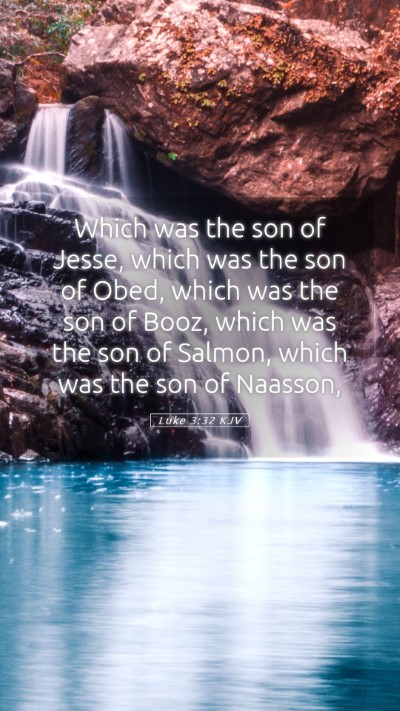Understanding Luke 3:32
The verse in focus, Luke 3:32, states: "The son of Jesse, the son of David, the son of Abraham." This passage is significant as it traces the lineage of Jesus, emphasizing His rightful place in the biblical narrative as the Messiah.
Verse Context and Significance
This verse is part of the genealogical record presented in the Gospel of Luke, where the intention is to establish Jesus' credentials as the promised Savior. Here are key insights derived from public domain commentaries:
-
Matthew Henry's Commentary:
Henry emphasizes the importance of genealogies in Scripture, arguing that they demonstrate God's faithfulness in fulfilling His promises. By linking Jesus to Jesse and David, it shows that Jesus fulfills the prophecies concerning the Davidic line.
-
Albert Barnes' Notes:
Barnes explains that Jesse is significant as the father of David, underscoring the continuity of God’s plan through generations. He asserts that the mention of Abraham connects Jesus to the covenant promises made to the patriarchs.
-
Adam Clarke's Commentary:
Clarke provides insights into the Jewish expectation of the Messiah as a descendant of David. He highlights that the mention of these figures not only affirms Jesus’ lineage but also His role in the restoration of Israel.
Key Themes and Insights
In exploring Luke 3:32, we uncover several important themes relevant to biblical study:
-
Fulfillment of Prophecy:
The genealogy serves as a genealogy link to prophetic fulfillment, indicating that Jesus is indeed the Messiah expected by the Jews.
-
Lineage and Legitimacy:
Establishing Jesus' lineage enhances His legitimacy as the rightful heir to the throne of David, fulfilling the expectations of the Jewish people regarding a deliverer.
-
Covenantal Promise:
The mention of Abraham's lineage illustrates God's long-standing covenant with His people, reaffirming that Jesus emerges from a deeply rooted history of promise and fulfillment.
Bible Verse Explanations
Understanding this verse requires delving into its implications for both the original audience and contemporary readers:
-
For the Original Audience:
Jews at the time recognized the significance of ancestry and lineage; thus, tracing Jesus back to David and Abraham would resonate with their expectation of a legitimate Messiah.
-
For Contemporary Readers:
Today, this verse invites believers to reflect on the continuity of God’s plan through history and the fulfillment found in Christ. It serves as a reminder of God's faithfulness across generations.
Application of Luke 3:32
This verse encourages personal reflection and application in various ways:
-
Identifying with Heritage:
Just as Jesus’ lineage is celebrated, believers are reminded of their own spiritual heritage and the legacy of faith passed down through generations.
-
Call to Faithfulness:
Understanding Jesus’ background emphasizes the importance of faithfulness in our own lives and families, aligning with the promises made by God to His people.
Related Bible Cross References
Luke 3:32 is interconnected with several other scriptural references:
- Matthew 1:6-16 - Details the genealogy of Jesus, presenting His royal lineage.
- Isaiah 11:1 - Prophecy concerning the Messiah emerging from the root of Jesse.
- Romans 1:3 - Acknowledges Jesus as coming from the lineage of David according to the flesh.
Further Study and Reflection
For those engaging in Bible study, Luke 3:32 serves as a foundation for deeper exploration of biblical themes. Utilize Bible study tools, guides, and resources to enhance your understanding:
- Bible Study Groups: Engage with others to discuss interpretations and applications of Scripture.
- Online Bible Study: Explore virtual platforms for deeper insights into biblical narratives.
- Study Lessons: Create structured lessons surrounding genealogies and their significance in Scripture.
- Historical Context: Understand the world of Jesus and the cultural implications of His lineage.
Conclusion
In summary, Luke 3:32 connects readers to the overarching narrative of Scripture, revealing God's consistent plan throughout history. The insights from renowned commentators illuminate the vital themes of fulfillment and legacy that resonate profoundly with both ancient and modern believers.


